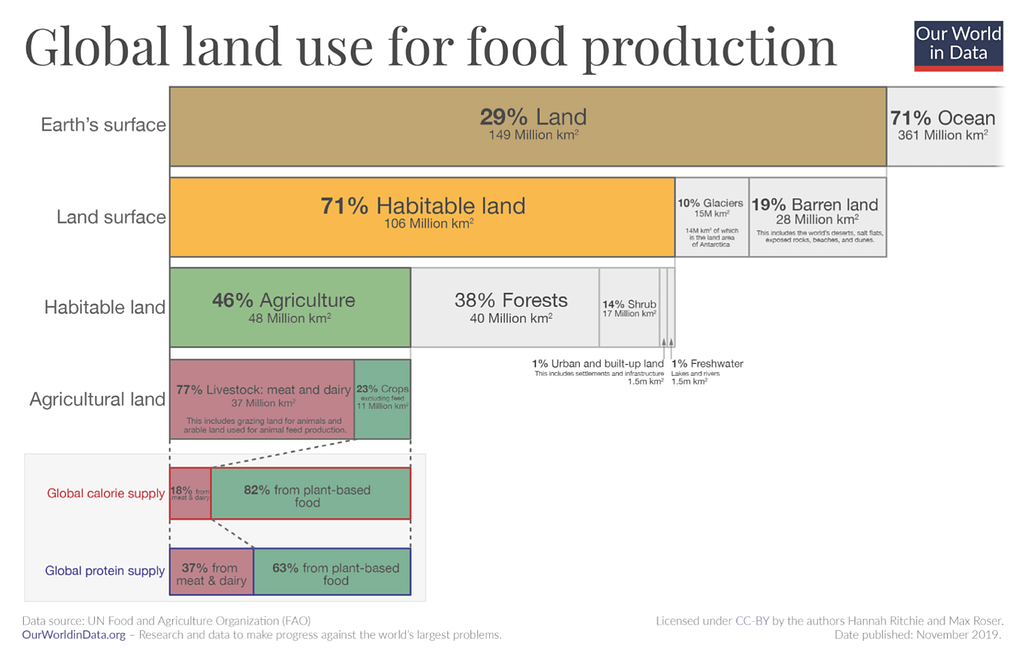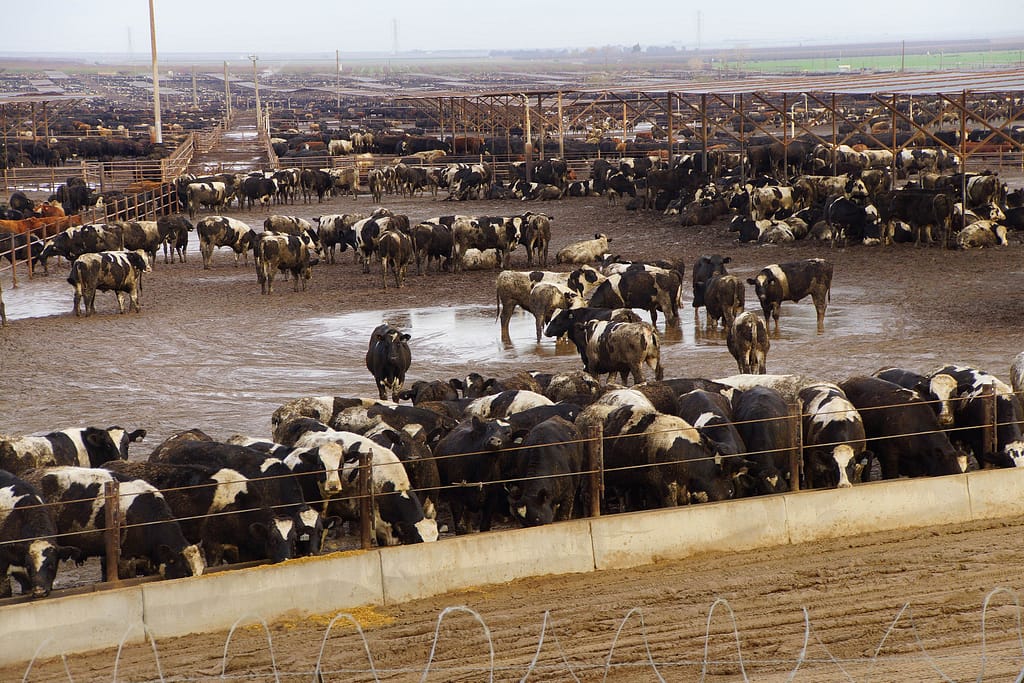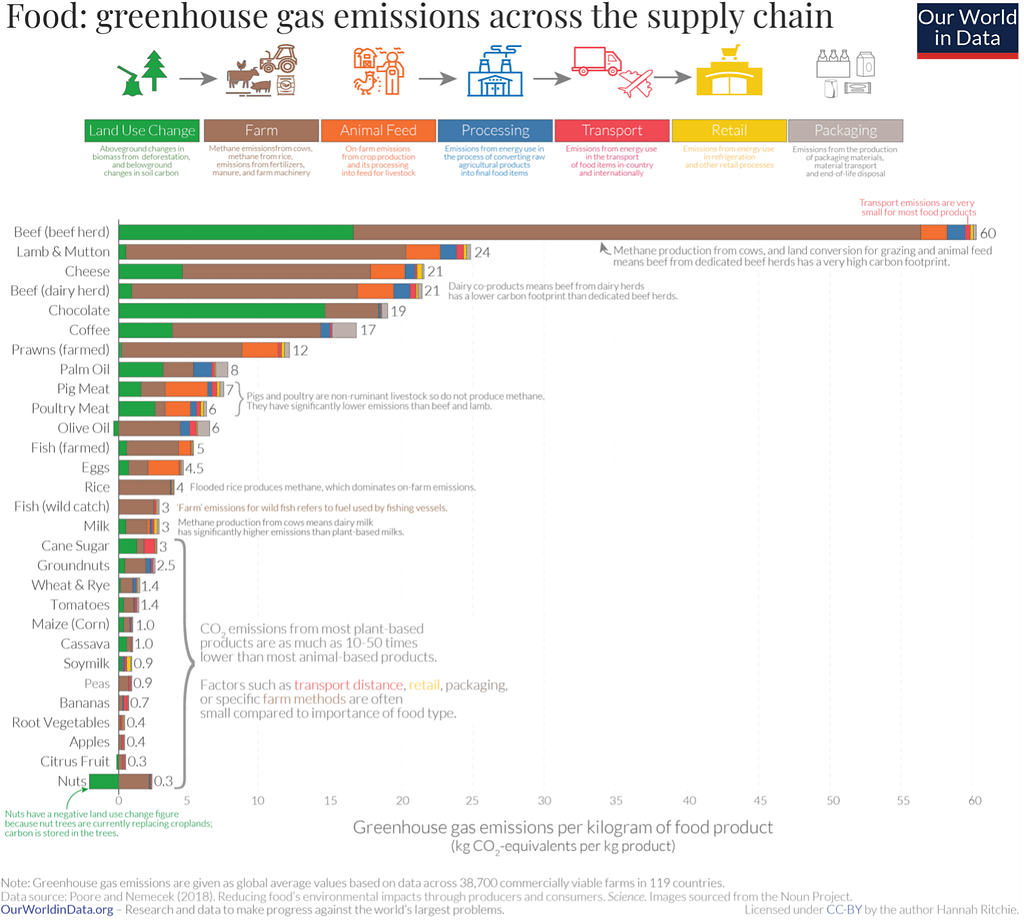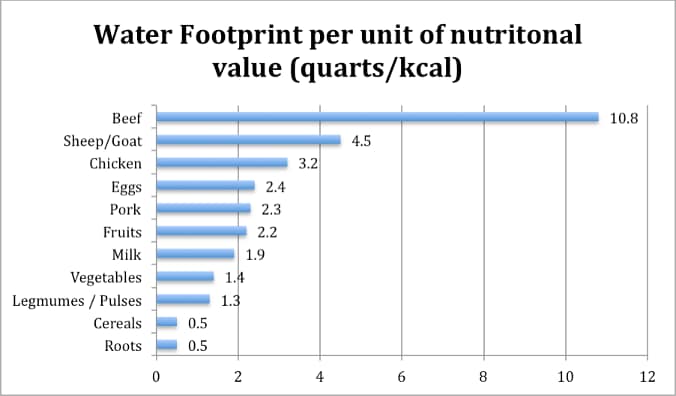The World One Argument
This article continues from Cowtroversy Part 1 – Regen vs Vegan, an overview of the opposing views of animals in agriculture. In this second article, we focus on World One’s Argument – arguing for low or no meat, with the extreme view being veganism.
Land Use
The amount of land needed for food production has increased to feed our growing population. This has been a major contributor to encroachment into natural ecosystems and a primary driver of deforestation and desertification. 46% of habitable land is taken up by agriculture, with just 23% of that being for crops. The remaining 77% of the land used for livestock provides only 18% of calorie supply and 37% of protein.

This argument is one of land use efficiency. Crops appear far more efficient converters of land area into nutrition. By eating less meat, and more plants we can keep pace with increased demand without using more land. And according to the data here, shifting to a vegan diet would significantly reduce land area needed, through the elimination of crops grown for animal feed. This negates a counterargument that large areas of pasture land are unsuitable for crop production.
The intensification of crop production therefore has been a good thing. Scientific approaches to fertilisation, irrigation, crop protection and genetics has decoupled the proportional relationship between land area and food output. This has allowed the world to produce more than enough food to eliminate mass starvation.
George Monbiot uses such data to argue strongly for land sparing. Organic and particularly the emerging regenerative agricultural movement are therefore the worst form of farming. He suggests that they are extensive rather than intensive. In other words, any approaches that reduce yields as these alternative farming approaches are thought to do, are fundamentally bad, implying that applied globally they would necessitate further encroachment into nature.
Professor Tim Benton, speaker at the Sustain #Meatdabate would probably agree. In this 2013 paper his research team found that when controlling for a 54% lower yield in lowland England, biodiversity of Organic fields of winter wheat exhibited no increase in biodiversity when compared to standard practice. This suggests that the increases in biodiversity observed in Organic systems is in direct proportion to the reduction in yield. This too favours the concept of intensification and land sparing.
From an innovation perspective, George Monbiot in his book Regenesis suggests that new forms of food can be produced through nascent technologies such as precision fermentation. For example, Solein®, developed by Solarfoods is in the final stages of development and commercialisation. Solein is based on the growth of single-cell organisms fed by gasses including CO2 and mineral nutrients to create protein macro molecules with a balanced nutritional profile. Making food partially from thin air and renewable energy in a tiny geographical footprint. Critics argue that developments such as these are unlikely to become dominant sources of food, being potentially bland and uninteresting to consumers. But Monbiot skilfully points out that when the first pastoralists had the idea of drinking milk from animals, they were not thinking about camembert! If he knew TRIZ, he would be pointing this out as a perfect example of S Curve innovation dynamics. Precision fermentation and other nascent technologies are right at the beginning of the S Curve, and have the potential to become the new dominant, most ideal form of food production – replacing traditional farming which will soon feel like being as antiquated as the horse and carriage.
The world one land use argument is therefore that it is best to phase out animal agriculture, continue intensification and efficiency which will free large areas to return to nature to the benefit of biodiversity.
Carbon
The viral film Cowspiracy.com states that “livestock and their emissions account for at least 32,000 million tons of carbon dioxide (CO2) per year, or 51% of all worldwide greenhouse gas emissions”. Whilst this headline is perhaps taking a very worst-case view, (they also mention the more widely accepted 18% figure), the consensus is that agriculture is a major contributor to carbon equivalent emissions.
A commonly quoted graphic to support the world one argument is the following from Our World in Data, based on analysis by Poor and Nemecek in 2018. It demonstrates that animal production and beef, in particular, dominates the greenhouse gas emissions arising from food production. This is largely due to the well-known contribution of methane emissions from belching ruminants. Again, the clear message is that a shift to an exclusively plant-based diet would make significant inroads to the net zero objective.
This graphic and similar versions are well known. You can find them in IPCC reports, COPxx events, the BBC website, school and university teaching materials, as well as activist productions such as Cowspiracy. At the sustain Meatdebate, Professor Tim Benton also quoted these figures.
Proponents of the opposing world view 2 claim that adaptive planned grazing strategies enable livestock to sequester carbon through increasing soil organic matter. A farmer-led movement subscribes to this view, the figurehead being Allan Savory who’s TED talk went viral in 2013.
In an attempt to settle the argument Garnet et al, published Grazed and Confused (2017) an extensive analysis of the available literature and data at the time. The team concluded:
“The potential contribution of grazing ruminants to soil carbon sequestration is small, time-limited, reversible and substantially outweighed by the greenhouse gas emissions they generate”
This study is cited by critics of ‘regenerative’ or organic farming as settling the argument. George Monbiot considers that regenerative is a nice-sounding name that is tantamount to greenwashing. “Regenerative farming is still farming, and farming is inherently bad”. Helpfully George has recently published an extract from his book Regenesis, which fleshes out why he believes regenerative grazing generally and Allan Savory specifically is wrong.
Water
Agriculture accounts for 92% of humanity’s water footprint, with animal agriculture taking a disproportionally large share, particularly beef. Water scarcity is an increasing problem that can be solved by restricting or eliminating animal agriculture.
Further, pollution from runoff of animal farming activities causes significant harm to watercourses, eventually ending up in the sea resulting in dead zones, eutrophication and harms to biodiversity.
Animal Welfare

Livestock have a bad life, especially those in confined factory-like facilities. Chickens and pigs are cramped together, reared for speed of growth, unable to express natural behaviours. Dairy cows are forcibly inseminated to give birth at unnatural times of year and torn away from their infant calves. Beef cattle are fed unnatural feedstuff and confined in dystopian feed lots for fattening and unable to lead a full life span. And all of them plied with steroids, antibiotics, other medications and inhumanely slaughtered.
These animals are cruelly exploited, whereas others are treated as family members, invited into our homes. Why should we see any sentient being as so different to another purely based on our socially adapted mindset and greed? As animals ourselves, we should treat all animals as we should do ourselves; equally, with empathy and love.
To the Vegan community, these arguments are sufficient in themselves to justify the cessation of animal-based agriculture. In the Sustain event, the vegan standpoint I heard was that the environmental reasons only serve to further validate this position.
Other Arguments
I sat for around 15 minutes with the XR protestors glued to the Hotel in Amsterdam hosting the 2022 Regenerative Food Systems Summit and asked them why they were there.
These well-educated young people have taken the data and statistics we have discussed, and together with pessimistic projections of climate sensitivity to CO2 formed a view of the current based upon a real sense of fear. The climate emergency. They see the causes being routed in power, systems of oppression, privilege, and politics. They blame colonialism, white privilege, white supremacy, misogyny, industrialisation, and western capitalism for destroying the planet, which corporate multinationals are continuing whilst engaging in greenwashing. And they were protesting the event because the big multinationals were leading the conference, which they saw as a greenwashing tactic.
Some of these arguments are aimed against both world views as long as they exist within a capitalist economic system. But they do hold that animal agriculture is responsible in large part for mass extinction and as such an existential threat to humanity.
World view one in a nutshell
The facts are clear. We have to intensify food production to reduce land use, rewild spare land freed up from the elimination of animal agriculture and encourage innovative new food production techniques provide new ways of feeding us. All this is essential to make a significant reduction in carbon emissions, preventing mass extinction.
At the Sustain event, I was party to a discussion that I think I can remember word for word.
“I really can’t see why we even need to debate this. It’s like anti-vaxers or climate deniers. It is so obvious that we basically have to ban meat, at least tax it like tobacco and ban advertising. There is no time for more talk or arguments, we are wasting time, I’m fed up to be honest we just have to act now”
In this huddle, there was broad agreement with this sentiment.
So, that’s it then; case closed. Or is it? Let us hop over to the other side and see how it looks over there in the next post – coming soon……


